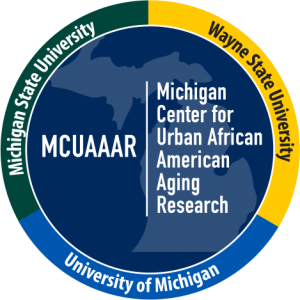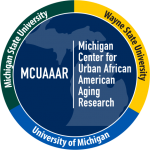
Michigan Center for Urban African American Aging Research
ROAR Launches Website
 The Recruiting and Retaining Older African Americans into Research (ROAR) project focuses on developing a sustainable national model to increase the representation of Black older adults in health research in a community-based way that elevates the voices of African American older adults at every step. You can find more information about ROAR on their newly launched website https://engageus.org/. The ROAR project is funded by the National Institute on Aging to accelerate the recruitment and retention of Black older adults into NIH-relevant research activities and to support the community development and partnership required to carry out this mission. ROAR is affiliated with MCUAAAR (Michigan Center for Urban African American Aging Research) and is utilizing the community-based approach of MCUAAAR’s Healthier Black Elders Center in Detroit as a model.
The Recruiting and Retaining Older African Americans into Research (ROAR) project focuses on developing a sustainable national model to increase the representation of Black older adults in health research in a community-based way that elevates the voices of African American older adults at every step. You can find more information about ROAR on their newly launched website https://engageus.org/. The ROAR project is funded by the National Institute on Aging to accelerate the recruitment and retention of Black older adults into NIH-relevant research activities and to support the community development and partnership required to carry out this mission. ROAR is affiliated with MCUAAAR (Michigan Center for Urban African American Aging Research) and is utilizing the community-based approach of MCUAAAR’s Healthier Black Elders Center in Detroit as a model.
 ROAR is focused on ensuring that Black older adults in Detroit and Flint, Michigan are better represented as participants in health research while also providing education and tools to support researchers and community members in understanding the importance of diverse research participation. ROAR is driven by two community advisory boards inclusive of older adults and community, civic, and faith leaders in Flint and Detroit, Michigan. Now in the second year of the ROAR grant, the Flint advisory board has celebrated their first anniversary, several free virtual health education programs have been offered to the community, a website was developed and launched to educate the public, and the new Flint Participant Research Pool is nearly ready to begin recruitment. The Participant Research pool is a registry of community-dwelling older adults interested in non-invasive research participation in studies that have been vetted both by a university institutional review board and the Community Advisory Board members of Healthier Black Elders in Flint (ROAR) or Detroit. This level of community review improves the trustworthiness of the research to community participants and ensures that research is ethical, accessible, and that research findings make their way back into the community who contributed their time and experiences. The new website also serves as a tool for recruiting for the Participant Research Pool and is for researchers and community members interested in learning more about minority aging and research.
ROAR is focused on ensuring that Black older adults in Detroit and Flint, Michigan are better represented as participants in health research while also providing education and tools to support researchers and community members in understanding the importance of diverse research participation. ROAR is driven by two community advisory boards inclusive of older adults and community, civic, and faith leaders in Flint and Detroit, Michigan. Now in the second year of the ROAR grant, the Flint advisory board has celebrated their first anniversary, several free virtual health education programs have been offered to the community, a website was developed and launched to educate the public, and the new Flint Participant Research Pool is nearly ready to begin recruitment. The Participant Research pool is a registry of community-dwelling older adults interested in non-invasive research participation in studies that have been vetted both by a university institutional review board and the Community Advisory Board members of Healthier Black Elders in Flint (ROAR) or Detroit. This level of community review improves the trustworthiness of the research to community participants and ensures that research is ethical, accessible, and that research findings make their way back into the community who contributed their time and experiences. The new website also serves as a tool for recruiting for the Participant Research Pool and is for researchers and community members interested in learning more about minority aging and research.
For more information, please visit www.engageus.org or email ROAR at [email protected]. You may also give ROAR staff a call at 810-309-8693.
Racial disparities in vulnerability to the coronavirus and the outcomes of the disease (African Americans and Hispanics have worse outcomes and die at drastically higher rates), have once again highlighted a pattern of health disparities that have been documented for decades. In addition, on the heels of the killing of George Floyd on May 25, 2020, city, county, and even state governments across the country are passing resolutions declaring racism as a public health crisis. These resolutions are an important first step, but this acknowledgment must come with resources to actually address the structural and institutional racism in the access to care and the quality of health care, which in turn results in increased morbidity and mortality for racial and ethnic minorities.
The Genesee County resolution, calls for, among other things:
- An assessment of internal policies and procedures to ensure racial equity is a core element of the Board of Commissioners and all Genesee County departments and offices;
- The creation of an equity and justice-oriented organization with the Board and its Committees identifying specific activities to increase diversity and incorporating anti-racism principles across Board membership, leadership, staffing, and contracting;
- A workplan of educational efforts to address and dismantle racism, expand members’ understanding of racism and how racism affects individual and population health;
- Policies that improve health in communities of color and support local, state, and federal initiatives that advance social justice, while also encouraging individual member advocacy to dismantle systemic racism;
- Working to build alliances and partnerships with other organizations that are confronting racism and encourages other local, state, and national entities to recognize racism as a public health crisis.
The resolution also notes that the Board of Commissioners will have to allocate adequate financial resources within its budget to accomplish these activities.

